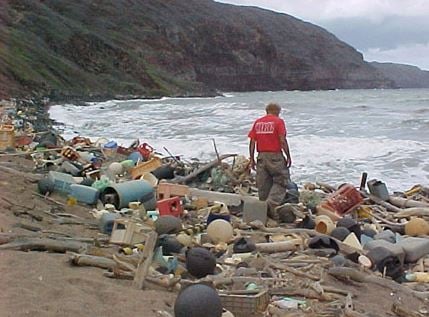Researchers Highlight the Need to Build Data to Tackle Marine Debris

WASHINGTON – The Wilson Center, a Washington, D.C.-based think tank, on Wednesday morning hosted an event explaining the complexities of measuring the presence of marine debris in the environment, focusing on the need to collect more data.
Measuring the problem at hand is linked to managing it, but most work on this at the moment relies on theoretical estimates rather than observed data. Plastics leak from the land to the coastal zones to the oceans. However, without accurate data it is difficult to set up empirically driven policies to address the problem.
“You cannot manage what you cannot measure. We actually need data,” Fabien Laurier, director of technology and innovation for Minderoo’s No Plastic Waste Initiative, said during the event.
Data will provide information on how debris is expanding, leaking into the oceans, and where, specifically, the debris is coming from.
This is crucial for addressing the problem, they intimated, and it would allow for a coordinated response, including things like “clean-up expeditions” to remove debris from the oceans or attempts to stop debris before it leaks to the coastal waterways.
It will take a “village” to address this problem, which is a global concern, Lauren Biermann, a scientist at Plymouth Marine Laboratory, emphasized at Wednesday’s presentation.
To do this, they use satellite imagery and machine learning. Satellites offer a relatively low-cost and scalable way of tracking the oceans of the world which can be made to help patrol the oceans to locate debris.
Plastic entering the oceans is a big international issue, and it is growing. By 2040, according to a study affiliated with Duke University and Pew Charitable Trusts, the plastic pollution ending up in the ocean will triple from 11 million to 29 million metric tons each year.
“That’s the same as dumping 110 pounds of plastic on every meter of coastline around the world,” a written statement from the Pew said.
The debris has an environmental cost. It destroys habitats, kills wildlife, and degrades the quality of human life in coastal communities, a US Department of the Interior report highlighted in 2019.
It also has a financial cost. Industries such as fisheries, shipbuilding, marine transport, and marine tourism are hampered by debris. Asian-Pacific economies lost $10.8 billion to plastic leakage in 2015, an Asia-Pacific Economic Cooperation report said. That’s eight times what they lost in 2009.
In the U.S., both the Democrat and Republican parties would seem to agree that is a serious problem. The bipartisan legislation Save Our Seas Act, or “SOS,” was signed under President Trump in 2018.
However, some environmentalists have criticized this marine debris-focused legislation as ignoring the root of the problem, which they argue is the entire lifecycle of plastics, including fossil-fuel production of plastics, and not simply a problem of litter. They argue that focusing on the litter distracts from the rest of the plastic’s lifecycle. And according to estimates, the “business as usual” approach won’t slow the problem sufficiently.
The Pew report pointed out that current commitments are not enough as they will only reduce the annual volume of plastic moving into the oceans by an estimated 7% by 2040. However, with existing technologies, they argue, it can be reduced by as much as 80%.
To do that, Pew’s report argued, a wide set of system wide changes would have to be adopted across governments and businesses around the world, ranging from disrupting the plastics industry to designing recycle-friendly products and building better disposal factories and improving waste collection.

























